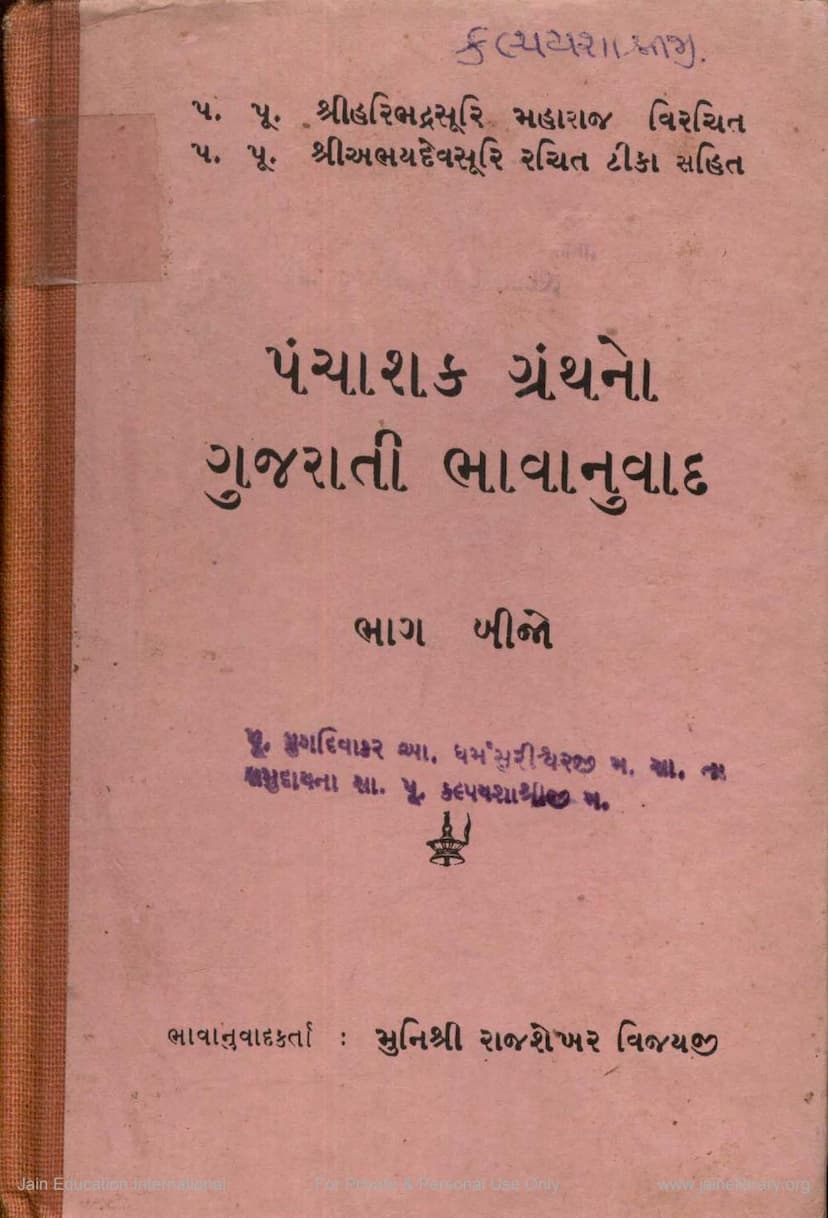Panchashak Part 2
Added to library: September 2, 2025

Summary
This document is a Gujarati translation of the second part of the Jain text "Panchashak," authored by Rajshekharsuri, published by Panchashak Prakashan Samiti, Navsari. The work includes a commentary by Abhaydeva Suri. The translator and editor is Muni Shri Rajshekhar Vijayji.
The document outlines the content of the second part of Panchashak, which appears to be a collection of fifteen "Panchashaks" (sections dealing with five aspects or covering five topics each), specifically from the eleventh to the nineteenth. Based on the table of contents, these sections cover:
Volume 2 Content:
- 11. Sadhudharmavidhi Panchashak: Discusses the conduct and principles of monks, emphasizing the importance of inner feeling (bhava) over external rituals. It defines the nature of a monk, the five types of conduct (charitra), and the significance of practices like Samayika (equanimity) and other conduct rules.
- 12. Sadhusamachari Panchashak: Details the ten types of conduct for monks, including Ichhakara (acting by choice), Mithyakar (confession of mistakes), and other behavioral rules.
- 13. Pindavidhi Panchashak: Focuses on the rules and ethics related to alms (pind), defining what constitutes pure alms, various types of impurities (doshas) in food, and the correct methods of receiving and consuming them.
- 14. Shilanga Vidhi Panchashak: Explains the eighteen thousand "Shilangas" (virtues or components of virtuous conduct), their origins, and the importance of their proper observance for maintaining chastity and virtue. It emphasizes the significance of diligence and the role of a Guru in upholding these virtues.
- 15. Alochanavidhi Panchashak: Deals with the process of confession (alochanā) for monks, outlining its meaning, the importance of confessing faults to a qualified Guru, the correct time and method for confession, and the karmic benefits derived from it.
- 16. Prayashchittavidhi Panchashak: Discusses penance (prayashchitt) for monks, defining its meaning, ten types of penance, and how various faults require different forms of atonement. It highlights the importance of inner repentance (bhava) for effective penance.
- 17. Kalpa Panchashak: Explains the rules and observances related to different "Kalpas" (conventions or rules) concerning monks, possibly in relation to different periods or circumstances. It touches upon the concepts of "Sthit Kalpa" (fixed rules) and "Asthit Kalpa" (variable rules), and the conduct of monks across different eras and Jinas.
- 18. Bhikshupratima Panchashak: Details the eighteen stages or vows (Bhikshupratima) that monks undertake, outlining the specific rules and practices associated with each stage, and the qualifications required for a monk to progress through these stages.
- 19. Tapovidhi Panchashak: Focuses on various forms of austerities (tapas) undertaken by monks, categorizing them into external and internal austerities, and explaining their significance in spiritual progress.
The document also includes a "Shuddhipatraka" (errata) list, correcting minor errors in pagination and spelling. It mentions that the commentary on pages 104 to 112 was not originally in the commentary but was added based on other texts like "Pind Vishuddhi" for completeness.
The publisher acknowledges financial contributions from various Jain sanghs and trusts for the publication. The book is dedicated to Acharya Shri Madhvije Harsurishwarji Maharaj. A list of other books compiled and translated by Muni Shri Rajshekhar Vijayji is also provided.
Overall, the document provides a detailed table of contents for the second part of "Panchashak," indicating a deep dive into the practical aspects of monastic life in Jainism, focusing on the conduct, discipline, penance, and spiritual development of monks according to ancient Jain scriptures.